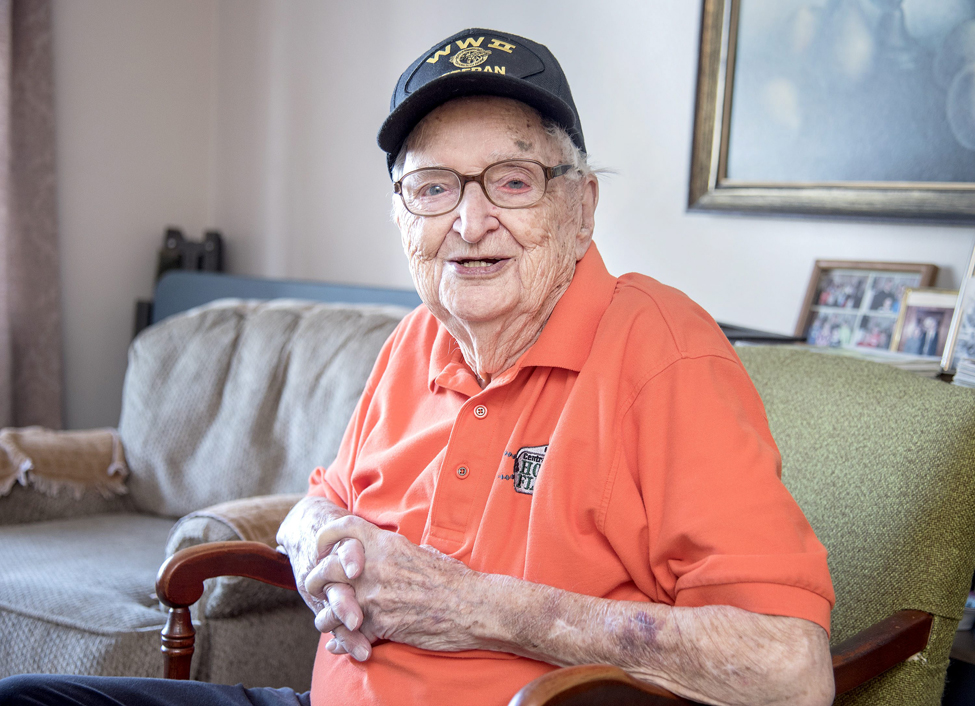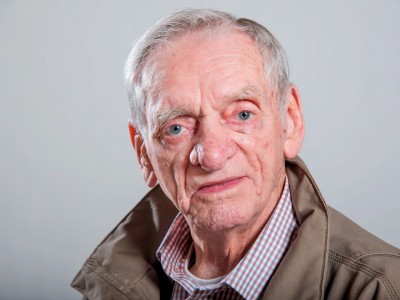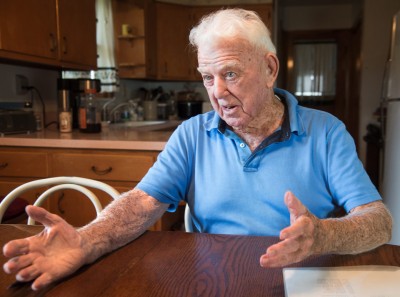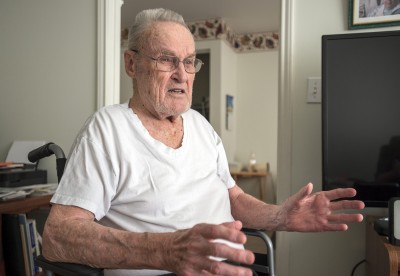Frank Morse
By Paul Wood

Photo By Rick Danzl/The News-Gazette
ROSSVILLE — Even in a large convoy zig-zagging its way across the Pacific, the USS Baxter was an attractive target for Japanese submarines and kamikazes.
Frank Morse was on the troop ship at several large battles in 1944 and 1945, serving as a meteorologist, and Japan was clearly losing World War II.
That made it the height of the kamikaze era, where pilots committed suicide by crashing their Zeroes into American ships, often starting huge fires.
The Rossville man, who turns 97 on Wednesday, remembers perfectly his days in the Navy, including a term in the Naval Air Corps.
He enlisted because, like so many Americans, he was angered by the Dec. 7, 1941, sneak attack on Pearl Harbor and other islands.
He remembers hearing about it around noon, when he was an education major at Eastern Illinois University, then Eastern Illinois State Normal School.
“It was a shock,” he said. “Some people said President Roosevelt knew it was coming, but I can’t believe he would have let it happen.”
Morse knew it was time for him to stand up.
“I didn’t want to be a shirker,” he said, a common phrase at the time for men who didn’t get behind the Allied effort.
After boot camp in San Diego, he briefly trained as a pilot, “but got lost” during an early flight.
Luckily, an instructor was in the plane with him.
Next, he learned about radar — then a radical improvement in warfare — and in predicting the weather. He doubled as a weatherman and a scout looking for airplanes, using the same tool.
Morse also helped improve maps of the area.
The USS Baxter had several dangerous missions after leaving for the Pacific from the East Coast, passing through the Panama Canal, he said. Later, he would develop malaria.
In October and November 1944, Morse’s ship was in the Leyte operation, landing several hundred troops. In the next month, it landed troops and equipment in the invasion of Luzon. In March 1945, it was directed toward the impending landings on Okinawa.
On Easter Sunday, Operation Iceberg landed huge Allied forces on the island south of Japan.
“Okinawa was very dangerous,” Morse recalled.
More than 200,000 soldiers and civilians were killed in the battles, with very high Japanese and civilian losses on the cave-filled island. The recent “Hacksaw Ridge” movie tells some of the story.
Even off the shore, the large convoy with the USS Baxter faced danger from subs, artillery and planes.
Once, a kamikaze missed the Baxter and smashed into the ocean, Morse remembered.
“We pulled the pilot out of the water and put him in jail,” he said.
He remembers something that still strikes him as funny as a Navy man — the “Marines thought they were so tough” but couldn’t handle seasickness.
After Okinawa, it was clear that taking on Tokyo was coming up soon.
“The tide had turned,” he said, as each island was taken.
Like other World War II veterans interviewed, Morse said it was a relief when two atomic bombs put an end to the war.
The Shelby County native moved to this area after the war and was a principal in Alvin and Rossville.
He married Mary Ellen in 1942, and they had two children.
Do you know a veteran who could share a story about military service? Contact Paul Wood at pwood@news-gazette.com.
Read more stories from local veterans:
 Mel Schriefer
ALVIN — After serving in Korea, Sgt. 1st Class Mel Schriefer faced an even greater danger — serving as a test subject in …
Mel Schriefer
ALVIN — After serving in Korea, Sgt. 1st Class Mel Schriefer faced an even greater danger — serving as a test subject in …
 Les Gadbury
MONTICELLO — It has been 72 years since Marine Cpl. Les Gadbury fought his way across Iwo Jima, and he still remembers t …
Les Gadbury
MONTICELLO — It has been 72 years since Marine Cpl. Les Gadbury fought his way across Iwo Jima, and he still remembers t …
 Bob Henderson
URBANA — Emeritus Professor Bob Henderson is a smart guy, and he can recognize somebody who isn’t, however powerful that …
Bob Henderson
URBANA — Emeritus Professor Bob Henderson is a smart guy, and he can recognize somebody who isn’t, however powerful that …